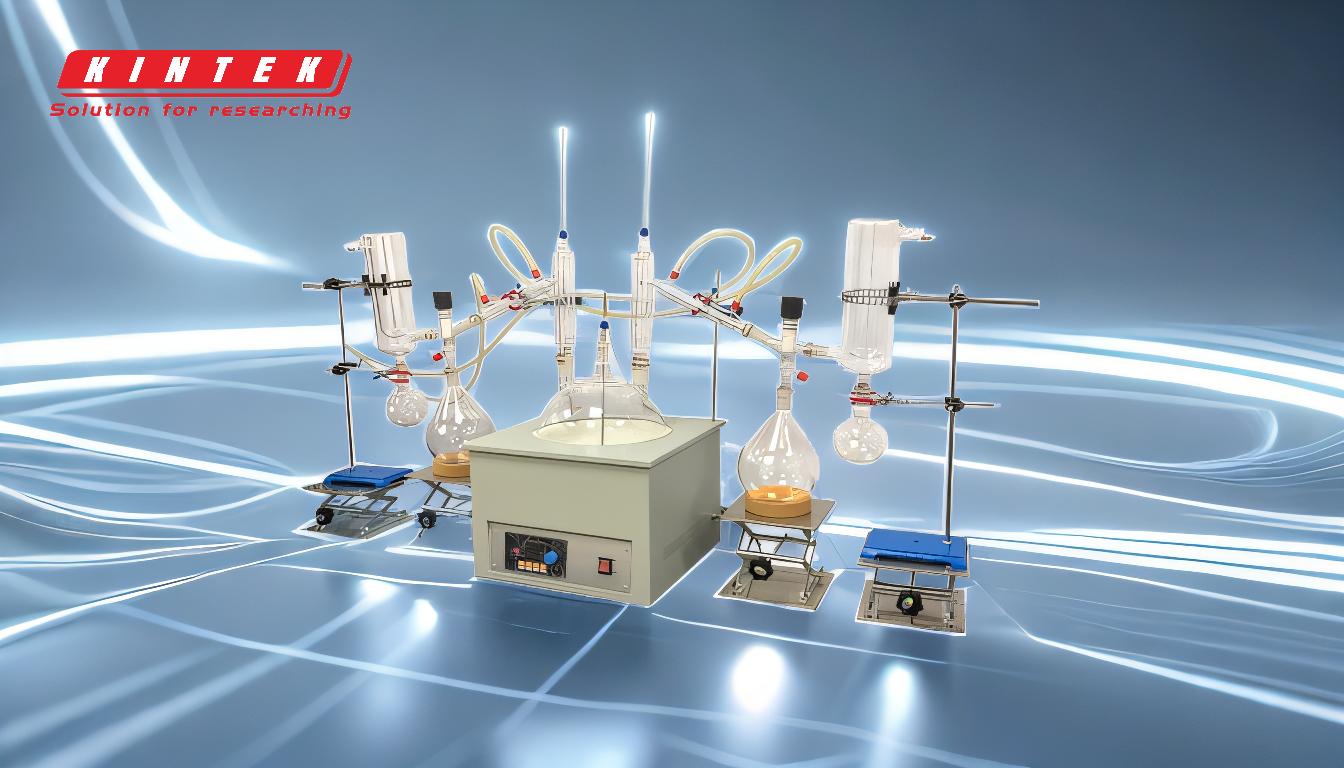Distillation is a separation process that relies on the differences in boiling points of components in a mixture. The boiling point of a compound is the temperature at which it transitions from a liquid to a gas. In distillation, heating a mixture to the boiling point of the desired compound allows it to vaporize, separate from other components, and then re-condense into a purified form. The boiling point is a critical factor because it determines the temperature required for vaporization and condensation, which are essential for effective separation. Additionally, controlling temperature and vacuum conditions is vital to prevent thermal degradation, oxidation, or contamination of the distillate. Short path distillation, often conducted under vacuum, leverages lower boiling points to achieve efficient separation while preserving the integrity of heat-sensitive compounds.
Key Points Explained:

-
Role of Boiling Points in Distillation
- The boiling point of a compound is the temperature at which it transitions from a liquid to a gas.
- Distillation relies on heating a mixture to the boiling point of the target compound, enabling it to vaporize and separate from other components.
- The vaporized compound is then condensed back into a liquid, resulting in a purified distillate.
- The boiling point determines the specific temperature required for effective separation, making it a critical parameter in distillation.
-
Separation of Components Based on Boiling Points
- In a mixture, compounds with different boiling points can be separated by heating the mixture to a temperature between their respective boiling points.
- The compound with the lower boiling point will vaporize first, leaving behind higher-boiling-point components.
- This principle allows for the isolation of specific compounds, such as cannabinoids or essential oils, from complex mixtures.
-
Importance of Temperature Control
- Precise temperature control is essential to ensure that the target compound vaporizes without causing thermal degradation or altering its chemical structure.
- Overheating can lead to the breakdown of heat-sensitive compounds, reducing the quality and yield of the distillate.
- Accurate temperature settings also prevent the vaporization of unwanted components, ensuring a purer final product.
-
Use of Vacuum to Lower Boiling Points
- Vacuum distillation is a technique that reduces the pressure inside the distillation apparatus, thereby lowering the boiling points of the compounds.
- Lowering the boiling point allows for distillation at reduced temperatures, which is particularly beneficial for heat-sensitive compounds like cannabinoids or terpenes.
- This method minimizes the risk of thermal degradation and preserves the integrity of the distillate.
-
Impact of Improper Temperature and Vacuum Settings
- Incorrect temperature or vacuum settings can lead to several issues:
- Thermal Destruction: Excessive heat can degrade the target compound, reducing its potency or altering its properties.
- Oxidation: Exposure to high temperatures or air can cause oxidation, leading to impurities in the distillate.
- Contamination: Improper settings may result in the vaporization of unwanted compounds, contaminating the final product.
- Accurate control of these parameters ensures the isolation of the desired compound without degradation or contamination.
- Incorrect temperature or vacuum settings can lead to several issues:
-
Applications in Short Path Distillation
- Short path distillation is a specialized technique used for purifying small quantities of compounds, particularly in industries like cannabis extraction or essential oil production.
- The process involves heating the mixture under vacuum conditions, allowing for efficient separation at lower temperatures.
- The boiling point of the target compound dictates the operating temperature, ensuring minimal thermal stress and high purity.
-
Practical Considerations for Equipment and Consumables Purchasers
- When selecting distillation equipment, consider the following factors:
- Temperature Range: Ensure the equipment can achieve and maintain the precise temperatures required for your target compounds.
- Vacuum Capability: Opt for systems with robust vacuum pumps to enable low-temperature distillation.
- Material Compatibility: Choose materials that are resistant to corrosion and can withstand the operating conditions of your process.
- Control Systems: Advanced temperature and vacuum control systems are essential for achieving consistent and high-quality results.
- For consumables, prioritize high-quality components like seals, gaskets, and condensers that can handle the specific demands of your distillation process.
- When selecting distillation equipment, consider the following factors:
By understanding the relationship between boiling points and distillation, purchasers can make informed decisions about equipment and consumables, ensuring efficient and high-quality separation processes.
Summary Table:
| Key Aspect | Description |
|---|---|
| Boiling Points | Determines the temperature needed for vaporization and condensation. |
| Temperature Control | Ensures vaporization without thermal degradation or contamination. |
| Vacuum Distillation | Lowers boiling points, ideal for heat-sensitive compounds like cannabinoids. |
| Short Path Distillation | Specialized technique for purifying small quantities under vacuum conditions. |
| Equipment Considerations | Temperature range, vacuum capability, material compatibility, and control systems. |
Ready to optimize your distillation process? Contact our experts today for tailored solutions!









